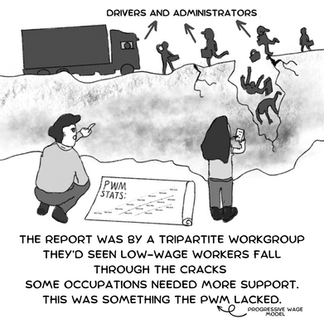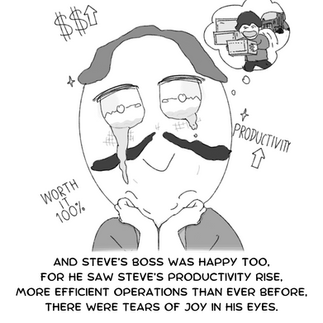In this Policy Explainer, find out...
Why were Occupational Progressive Wages introduced?
How do Occupational Progressive Wages differ from Sectoral Progressive Wages?
How will employers and employees be affected by these changes?
Introduction
From 1 March 2023, Administrators and Drivers who are either Singaporeans or Singapore Permanent Residents have begun receiving Occupational Progressive Wages (OPW) as part of the Government’s effort to extend wage growth support under the Progressive Wage Model (PWM).¹ This marks the first time progressive wages will be applied by occupation rather than by sector, benefitting a larger proportion of low-income workers.
The Progressive Wage Model and emergence of Occupational Progressive Wages
The PWM was introduced in 2014 to support wage growth among low-income workers. This is achieved by tying wage increases to skills training, thus providing career growth for workers, generating productivity gains and profits for employers, and increasing service quality for customers. As of March 2023, the PWM has been introduced in six sectors - Cleaning, Security, Landscaping, Lift and Escalator, Retail, and Food Services.² The PWM has also succeeded in promoting wage growth, with real median wages growing faster in sectors where the PWM has been introduced.³
However, the sectoral approach adopted by the PWM has made the application of progressive wages challenging for occupations that exist across multiple industries e.g. administrators and drivers. The reasons are twofold. First, these occupations lack a clear representative employer or organisation that can lead wage negotiations. Second, the type of work, skills requisites, and wage levels vary significantly based on the sector of employment.
Given these circumstances, the tripartite partners - consisting of the Ministry of Manpower (MOM), National Trades Union Congress (NTUC) and Singapore National Employers Federation (SNEF) - had not been able to design detailed job and skills ladders to support the implementation of Sectoral Progressive Wages (SPW).⁴
In light of the above, the Tripartite Workgroup on Lower-Wage Workers (TWG-LWW) recommended the introduction of OPW for the Administrator and Driver roles in August 2021. Not only are these widely prevalent occupations among low-income workers, with employment in the Administrative & Support Services and Transportation & Storage categories accounting for 23% of total employment of full-time low-income workers respectively, but they are also fairly homogenous, meaning that they could be categorised into unique occupational levels.⁵
Occupational Progressive Wages for Administrators and Drivers
Modelling after past SPW, OPW is designed with three objectives in mind: 1) to provide clear career pathways for workers within their occupational groups, 2) to ensure wage growth commensurate to their job level, and 3) to improve the skills and productivity of workers through training, thus ensuring that wage increases are sustainable for employers.⁶
The Administrator occupational group consists of three job levels:⁷
Administrative Assistants tasked with basic administrative work e.g., data entry clerks, and office attendants. The gross monthly salary is ≥ $1,500.
Administrative Executives who undertake higher-order administrative duties e.g., receptionists, and office cashiers. The gross monthly salary is ≥ $2,000.
Administrative Supervisors who perform supervisory functions e.g., office supervisors. The gross monthly salary is ≥ $2,800.
The Driver occupational group consists of two job levels:⁸
General Drivers who operate vehicles that require a Class 1, 2, or 3 driving license. The gross monthly salary is ≥ $1,750.
Specialised Drivers who operate vehicles that require a Class 4 or higher driving license. The gross monthly salary is ≥ $1,850.
Why does this matter?
Collectively, the introduction of OPW has benefitted 195,000 full-time and part-time workers in the Administrator and Driver occupational groups. Among them, approximately 32,000 full-time Administrators and 5,000 full-time Drivers who had earned wages below the OPW requirement have received wage hikes.⁹
Furthermore, all Administrators and Drivers earning OPW must now attain at least one Workforce Skills Qualification (WSQ) Statement of Attainment or undergo one in-house training programme.¹⁰ This translates to skills upgrading for workers, contributing to performance and productivity gains that will justify (further) wage increases.
For employers, the introduction of OPW will lead to higher labour costs, which can have deleterious effects on a business's profitability. However, as employees receive additional training, they are expected to become more proficient at existing tasks or undertake larger responsibilities that will raise their value-add to the business’s operations. Hence, the effect of rising wages will be partially mitigated. Yet, such gains will take time to be reaped, and some employers are in need of support to cushion the impact of paying OPW.
With this in mind, MOM has introduced the Progressive Wage Credit Scheme, which will be leveraged to co-fund 75% of eligible wage increases.¹¹ This will be carried out until 2026 and will provide assistance for employers transiting to paying OPW.
In addition, a six-month grace period will be provided for employers to adjust to the wage requirements.¹² Thus, for any incidents of non-compliance, MOM will focus on educating employers on the new requirements, rather than conducting enforcement via the suspension of work pass privileges.
Conclusion
OPW has built upon the strong foundation laid by the PWM by extending meaningful wages and wage growth to Administrators and Drivers. Together with the implementation of Sectoral PWs for the Waste Management sector, up to 94% of low-income workers will be under the PWM from July 2023.¹³ Thus, amidst Singapore’s continued growth and prosperity, these measures will ensure that no Singaporean is left behind.
This Policy Explainer was written by members of MAJU. MAJU is an independent, youth-led organisation that focuses on engaging Singaporean youths in a long-term research process to guide them in jointly formulating policy ideas of their own.
By sharing our unique youth perspectives, MAJU hopes to contribute to the policymaking discourse and future of Singapore.
.png)



















